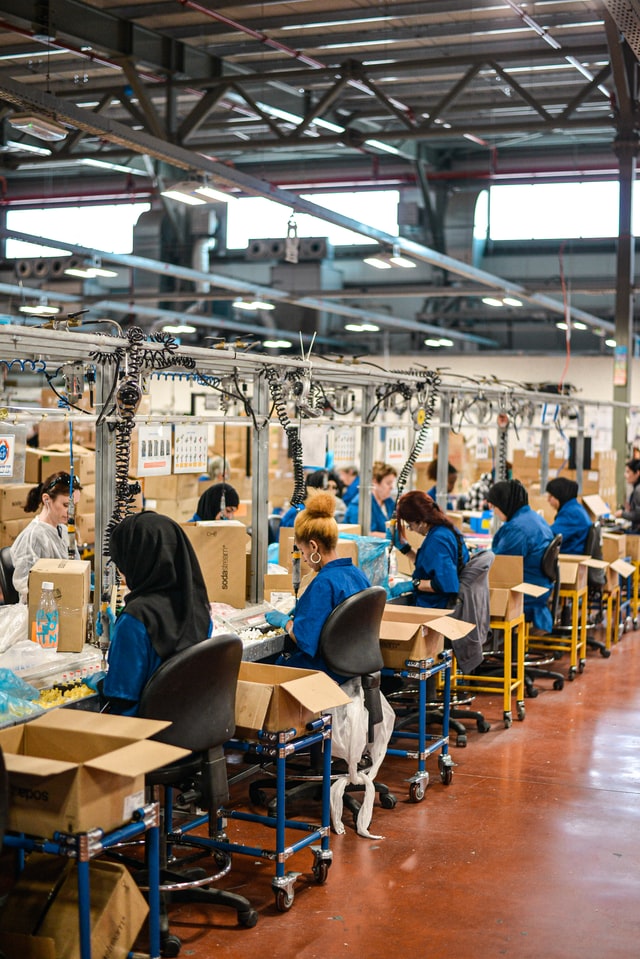
Is getting off the ‘treadmill of production’ rudimentary to combat climate change?
Article by Kayla Truter
Photo by Remy Gieling on Unsplash
‘Six promises you can make to help reduce climate change’[1] was the title of my Monday morning Guardian read, whereby the author claimed that ‘dressing retro’ and ‘eating green’ would inevitably save our planet and account for a ‘quarter of the required emissions reductions needed to keep the global heating down to 1.5C’. However, the impact required by the alterations to the lives of the majority of consumer-driven society is insignificant because ‘less stuff more joy’[2] lies at the hands of production, not societal greed.
I could not start pointing the ‘climate change finger’ without shedding light on the crumbling status of our planet. As it stands the ‘Statista Global Climate Change – Statistics and Facts’[3] showed our 2021 ended with: worldwide CO2 emissions[4] at 36.4 billion metric tonnes, the extent of sea ice[5] in the Northern Hemisphere at 12.19m km2 and weather catastrophe economic losses[6] globally to be 329 billion U.S. dollars. Here we can see just a minute insight into the extent global warming is impacting and will continue to impact our planet if society remains on this treadmill of production.[7]
‘Supply and demand’ is a mythical statement on the ‘treadmill of production’…consumers, are like small fish in a massive ocean of production and the reasoning for this all correlates back to the beast itself: capitalism. Allan Schnaiberg offers a Marxist view of capitalism proposing that production has more power to affect consumption rather than vice-versa in his theory of society-ecosystem interaction; ‘Individuals, communities, states and corporations consume only the outputs of a given production technology… While consumers can accept or reject these products, they have no influence over the allocation of capital to productive technologies.’[8] The exerted labour and volume of production come from decisions that don’t involve the consumer; we as consumers have zero say in regards to the use of raw materials, energy sources or the number of greenhouse gases emitted. These components are what drive mass production but consequently kill our planet. Marx brought attention to the fact that ‘the growth of machinery and the division of labour allowed more commodities to be produced “in a shorter time” and how “the store of raw materials must grow” at the same time. All of this directly requires increases in the quantity of matter-energy throughout, for the expansion of production in the pursuit of the accumulation of capital on a greater scale.’[9] Here we can see Marx’s justification for the capitalist mode of production underpinning environmental degradation whereby the production-ecosystem relationship is direct in comparison to the indirect nature of the consumption-ecosystem relationship. The decisions made during production mould and structure consumption; as Henry Ford once said “Any customer can have a car painted any colour that he wants so long as it is black.”[10]
Realistically, shifting blame away from consumers only removes some guilty conscience but feeling better about ourselves as consumers won’t stop ice caps from melting or our global temperature from rising: so, what can actually be done to make sure we don’t watch the demise of our planet before our eyes? The systematic nature of our global problem cannot be eliminated by small, voluntary, lifestyle responses… ‘business as usual with minor reforms is not an option.’[11] We require the agency of governments and international political organisations to perform a radical collective response, resulting in changes that would make an impact; the Green New Deal[12] is an example of this. This deal has the objective of bringing ‘U.S greenhouse gas emissions down to net-zero’ and meeting ‘100% of power demand in the country through clean, renewable, and zero-emission energy sources by 2030’. This deal solely requires actions of the federal government, where The Green New Deal puts forward adjustments such as ‘investing in manufacturing and industry to spur growth in the use of clean energy and ‘supporting family farming, investing in sustainable farming and building a more sustainable and equitable food system’. The alterations suggested fall in line with Schnaiberg’s position of the reorganisation of the political-economic system, where production will be able to prioritise ecological sustainability and human welfare over uneven growth accumulation of capital. Only through a change to the profit-driven, resource-exploiting system will we see the wanted abolishment of Climate Change, instead of focusing on the initially proposed personal shifts to our own lives. [13]
[1] https://www.theguardian.com/environment/2022/mar/07/six-promises-you-can-make-to-help-reduce-carbon-emissions
[2] https://www.theguardian.com/environment/2022/mar/07/six-promises-you-can-make-to-help-reduce-carbon-emissions
[3] https://www.statista.com/topics/1148/global-climate-change/#topicHeader__wrapper
[4] https://www.statista.com/statistics/276629/global-co2-emissions/
[5] https://www.statista.com/statistics/505568/sea-ice-extent-in-december-in-the-northern-hemisphere/
[6] https://www.statista.com/statistics/818411/weather-catastrophes-causing-economic-losses-globally/
[7] https://www.taylorfrancis.com/books/mono/10.4324/9781315631479/treadmill-production-kenneth-gould-david-pellow-allan-schnaiberg
[8] https://www.taylorfrancis.com/books/mono/10.4324/9781315631479/treadmill-production-kenneth-gould-david-pellow-allan-schnaiberg
[9] https://link-springer-com.manchester.idm.oclc.org/content/pdf/10.1007/s11186-005-1993-4.pdf
[10] https://www.nature.com/articles/519298a
[11] https://www.taylorfrancis.com/books/mono/10.4324/9781315631479/treadmill-production-kenneth-gould-david-pellow-allan-schnaiberg
[12] https://www.investopedia.com/the-green-new-deal-explained-4588463
[13] https://www.theguardian.com/environment/2022/mar/07/six-promises-you-can-make-to-help-reduce-carbon-emissions

0 Comments